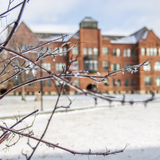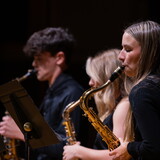Nebraska Wesleyan University’s annual Visions and Ventures Symposium will feature award winning activists, scientists, and content creators that aim to break down the boundaries of race, class and the environment.
The symposium will be held September 21 and 22. Due to COVID-19, the symposium will be held virtually via Zoom.
The Visions and Ventures Symposium is held each year and provides students, faculty and staff the opportunity to spend a day focused on an issue of national importance. Classes are cancelled for the day to allow full campus participation.
Speaker schedule:
Tuesday, September 21
5 p.m. – Naomi Oreskes, Henry Charles Lea professor of the history of science at Harvard University. Oreskes is the author/co-author of 7 books, and over 150 articles, essays and opinion pieces. She is a world-renowned geologist, historian and public speaker – becoming a leading voice on the role of science in society and the reality of anthropogenic climate change.
Her numerous awards and prizes include the 2019 Geological Society of American Mary C. Rabbitt Award, the British Academy Medal 2019, and the 2016 Stephen Schneider Award for outstanding Climate Science Communication, to name a few.
Oreskes is a fellow of the American Geophysical Union, the Geological Society of America, the American Association for the Advancement of Science, the American Academy of Arts and Sciences, and the American Philosophical Society. Learn more.
Wednesday, September 22
10 a.m. – Catherine Flowers, founder and director for the Center for Rural Enterprise and Environmental Justice, and professor of practice at Duke University.
She is an award-winning activist that seeks to address the root causes of poverty by seeking sustainable solutions.
Flowers is also the Rural Development Manager for the Equal Justice Initiative which serves the citizens of Lowndes County, one of the ten poorest counties in Alabama’s Black Belt. Flowers helps to address the county’s many environmental and social injustices. Her work there addresses the lack of sewage disposal infrastructure and the legacy of racism and neglect stretching back to the time of slavery.
She is an internationally recognized advocate for the human right to water and sanitation, and she works to make the UN Sustainable Development Agenda accountable to frontline communities. Flowers was awarded a 2020 MacArthur Fellowship grant for her work as an Environmental Health Advocate. Learn more.
12 p.m. – Joycelyn Longdon, climate research student at Cambridge University, and founder of Climate In Colour. Longdon is an incoming MRes and PhD student where she studies the use of artificial intelligence to address climate resilience. Longdon and the Climate In Colour aim to make climate science and social justice conversations more accessible, diverse and creative. Learn more.
3 p.m. – Latoya Roby Frazier, photographer, and associate professor of photography at the Art Institute of Chicago. Frazier is a critically acclaimed photographer whose work depicts the unsettling reality of today’s America: post-industrial cities divided by poverty, racism, healthcare inequality, and environmental toxicity.
She aims to feature voices and perspectives traditionally erased through her marriage of art and activism. Frazier teaches her audiences how art is a powerful tool for social transformation.
Frazier received the prestigious MacArthur “Genius” Fellowship, the John Simon Guggenheim Memorial Foundation Fellowship, and was chosen by Ebony as one of their 100+ Most Powerful Women of All Time, among other honors and awards. Learn more.










